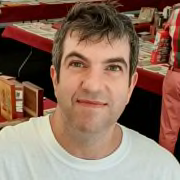
A.J. Jacobs
Joined: Nov 21, 2012
A.J. Jacobs is an author, journalist, lecturer and human guinea pig. He has written four New York Times bestsellers that combine memoir, science, humor and a dash of self-help. Among his books are The Know-It-All, The Year of Living Biblically, and Thanks a Thousand, in which he travels the globe to thank everyone who had even the slightest role in making his morning cup of coffee. He is a contributor to NPR, The New York Times, and Esquire, among others. He has given several TED talks, including ones about living biblically, creating a one-world family, and living healthily that have amassed over 10 million views. He was the answer to 1-Down in the March 8, 2014 New York Times crossword puzzle.

Online dating and swiping on Tinder have nothing on romance in the past, which was often humiliating, dangerous, and exhausting.
The nostrils of our ancestors were constantly assaulted by unimaginable odors. Here are six reasons that you should be happy you and your nose in modern times.
Author A.J. Jacobs breaks down why you should be thankful you’re celebrating Halloween today and not in eras past.
In researching his latest book, ‘The Year of Living Constitutionally,’ author A.J. Jacobs came across some bizarre suggestions floated by members of the Constitutional Convention for the new United States government.
The genre of books that contain hidden clues leading to a buried treasure or cash prize is sometimes called “armchair treasure hunts.”
Criteria include ingenuity, staying power, the puzzles’ effect on history—and whether they gave the author a good kind of headache or bad kind of headache.
Edgar Allan Poe loved ciphers—and in 1841, "The Raven" author issued a cipher-related challenge.
In Victorian England, romance was a literal puzzle. Here are three ways that 19th-century singles pitched woo.
How did Americans make money during the Great Depression? Some sold apples on street corners and others became migrant farmers. But about 2 million Americans tried to strike it rich another way: By doing puzzles.
A.J. Jacobs shows that although privacy may be endangered in the digital age, we’re still better off than many of our ancestors. In the past, everyone was all up in your business.